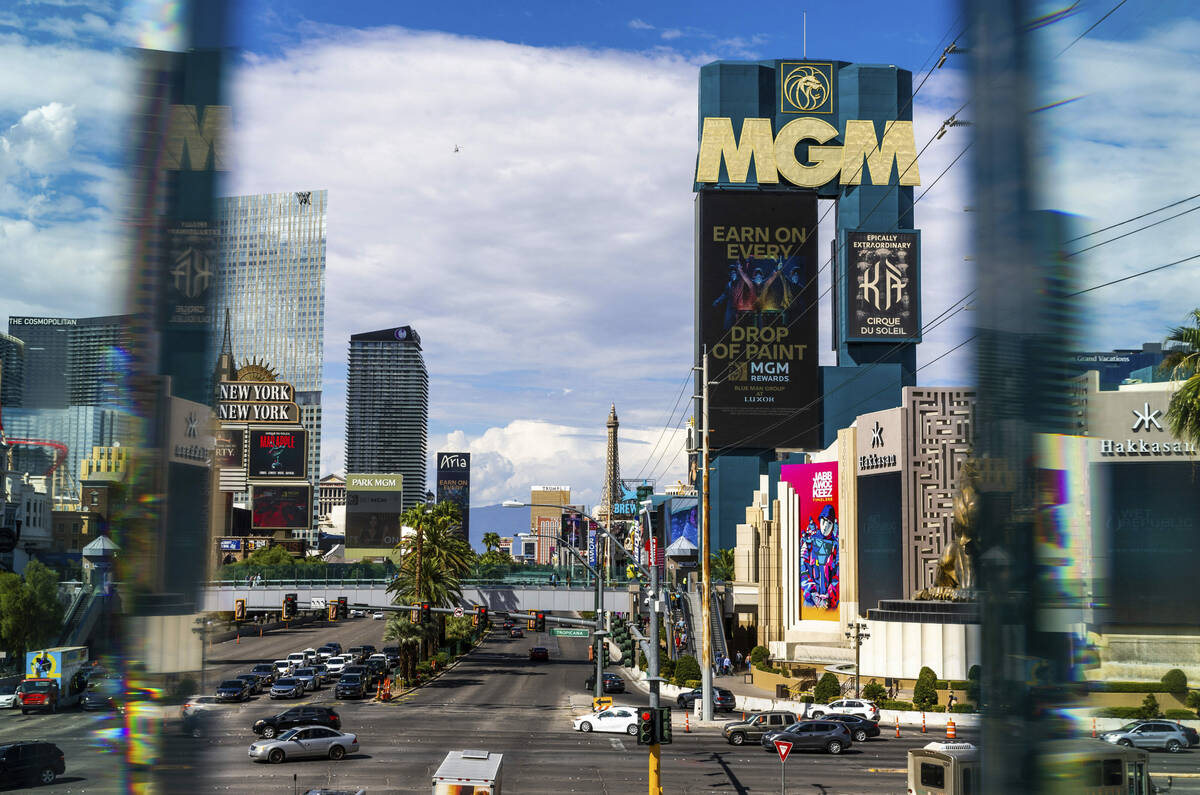Two big fines against two MGM properties and Resorts World resulted in different responses and perspectives from those paying $19 million in fines.

In the wake of an investigation into illegal bookmakers laundering money at two of its Las Vegas casinos, MGM Resorts International says it has stepped up its efforts to prevent further violations.
It’s spending more than $1 million on anti-money laundering compliance. And in the past 10 years, it has filed 46,000 suspicious-activity reports, and the company has banned more than 2,600 customers from playing, just to name a few of the changes MGM Resorts officials outlined to gaming regulators in April.
Over the past two months, the Nevada Gaming Commission has ordered $19 million in fines on MGM Resorts and Genting Berhad, owner of Resorts World Las Vegas, in an effort to crack down on money laundering by illegal bookmakers. The companies showed different responses to being assessed some of the highest fines ever ordered by Nevada gaming regulators.
In March, top executives and members of a newly established gaming regulatory compliance committee at Resorts World let outside counsel go over the particulars of a settlement involving a $10.5 million fine — the second highest ever assessed — while commissioners considered approval of the disciplinary action and scolded the property for allowing an illegal bookmaker to play at the casino for 20 months after the property opened in 2021.
Ultimately, commissioners voted 4-0 with one abstention to approve the fine. A Resorts World team consisting of CEO Jim Murren; former Gaming Control Board Chairman A.G. Burnett; Michelle DiTondo, a seasoned human resources executive who worked at MGM and Caesars Entertainment; K.H. Tan, Genting’s president and CEO; and former Nevada Gaming Commission Chairman Brian Sandoval, a former Nevada governor, attorney general, federal judge and current president of the University of Nevada, Reno; and Resorts World CEO Alex Dixon sat stoically and absorbed the critical commission comments.
A month later, MGM took a different tack when the commission approved an $8.5 million fine with the same vote for allowing two illegal bookmakers to gamble at MGM Grand and The Cosmopolitan of Las Vegas from 2017 through 2020.
Common denominators
There were two common denominators in each case. Scott Sibella was the top executive at both MGM Grand and Resorts World when the incidents occurred, and one of the illegal bookmakers in both cases was California resident Mathew Bowyer. Sibella had his license revoked by the commission in December.
In the April meeting, outside counsel summarized what MGM was going to do to prevent illegal gamblers from ever playing again at its properties, then made an hourlong presentation from compliance committee members to detail what went wrong and how they would prevent it from happening again.
While MGM CEO Bill Hornbuckle was noticeably absent — he was in Osaka, Japan, for the groundbreaking of the company’s $10 billion resort project, Japan’s first foray into gambling — other executives took over with a 20-minute affirmative presentation.
MGM Senior Vice President and Chief Compliance Officer Stephen Martino, Chief Legal and Administrative Officer John McManus and Richard Morgan, founding dean of UNLV’s Boyd School of Law and the longest-serving independent member of MGM’s compliance committee, told commissioners how they plan to stop illegal play and money laundering from occurring again.
“You hire the best advisers to help you put together the best plans and the best policies and put the best staff in place and you try to be fully compliant, but inevitably, you fail because your organization is comprised of human beings and human beings are always going to make mistakes, hopefully not big ones, but they are going to make mistakes,” Morgan told commissioners.
“When they make mistakes, the question is what do you do? Do you bury them? Do you encourage people to stonewall and sweep it under the rug? Or do you encourage people to speak up and say, ‘I made a mistake,’ or ‘My team made a mistake,’ or whatever? MGM’s policy is the latter, to try to get people to own up to or at least disclose problems as soon as they know about them so that they can be investigated. And if there is merit to the fact or to MGM’s responsibility for the problem, for MGM to take ownership of it, and to fix it, and to learn from it.”
Eight improvements
Martino detailed eight improvements MGM has implemented to protect it in the future. He also explained a timeline of changes at the company since 2013, the last time it had a compliance committee overhaul. It hired a Los Angeles-based multinational law firm, Gibson, Dunn & Crutcher LLP, to revise committee practices. Since 2013, the IRS conducted 20 audits of MGM’s anti-money laundering program and found no issues.
Since 2015, he said, MGM has filed 46,000 suspicious-activity reports and the company has banned more than 2,600 customers from playing.
Martino outlined the newest committee revisions that have been implemented:
— Formalized a process to share credit information between the credit department and the compliance department to assist in the company’s “Know Your Customer” program.
— Adopted a requirement for compliance to reach out to a customer’s casino marketing host to obtain information. Formerly, that was an informal communication.
— Enhanced due diligence has been ordered annually for the company’s top 25 cash customers in addition to its top 50 customers.
— Created a new procedure to address transactions in excess of $100,000, regardless of whether the customer comes in with large or small bills.* Formalized a process to escalate reviews within the compliance department for patrons with multiple suspicious activity report files.* Spending more than $1 million on anti-money laundering compliance.
— Ordered additional enhanced training for casino marketing staff, emphasizing its responsibility to know its customers, including their source of funds, and to report any suspicions to the compliance department.
— Added an awareness campaign for all line-level employees about anti-money laundering compliance responsibilities.
“While they have no specific responsibilities for AML compliance, we are also initiating an awareness campaign for employees who have contact with customers, including dealers, valet staff, room attendants and even caddies at Shadow Creek (Golf Course), emphasizing to them the need to report any information that may come to their attention, indicating that a customer may have unlawful sources of funds,” Martino said.
Anonymous tips
He said information can be relayed anonymously through MGM’s digital employee communications channels with postings in back-of-house locations such as dealer break rooms and employee dining rooms.
“We are hopeful that this campaign will provide one more source of information to keep MGM in compliance with all applicable laws,” he said. “So we’ve had an increase in scale, increase in responsibilities, and we will continue to work hard to do better.”
It’s not over
Disciplinary actions haven’t ended in the Resorts World incident.
A complaint was filed on the same day the Resorts World complaint was made against Nicole Bowyer, who was a registered independent agent contracted by the company.
As an independent agent, Nicole Bowyer was allowed to directly profit from her husband’s casino wagering. State gaming regulators have yet to adjudicate her disciplinary complaint.
There also have been numerous reports that Control Board investigators are looking into play by illegal bookmakers at other Strip properties. The Control Board doesn’t comment on pending investigations.
That’s a concern that has been raised by Sibella, who believes he has been singled out for prosecution by authorities and that other casinos have hosted illegal gamblers over the years.

